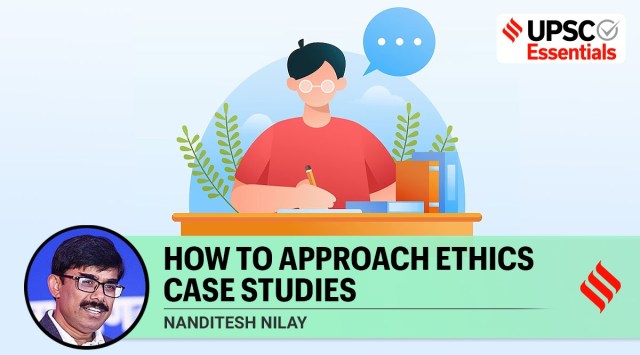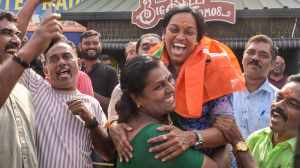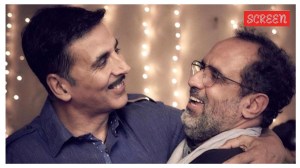One of the essential changes was the introduction of a complete descriptive paper on Ethics, Integrity and Aptitude. This was a new paper, so no one had any idea about the kinds of questions that could be asked in this paper and how to answer them. The most ambiguous area of this paper, which still remains a big challenge in terms of time and content is the CASE STUDY section.

Since UPSC Essentials of The Indian Express has been constantly receiving queries and doubts related to the case studies of Ethics paper of UPSC, Manas Srivastava takes up some of the common questions in our Experts talk today with our Ethics expert, Dr Nanditesh Nilay.
About our Expert: Nanditesh Nilay is the author of ‘Being Good and Aaiye, Insaan Banaen’ and ‘Ethikos: Stories Searching Happiness’. He teaches courses on and offers training in ethics, values and behaviour. He has been the expert/consultant to UPSC, SAARC countries, Civil services Academy, National Centre for Good Governance, Central Bureau of Investigation (CBI), Competition Commission of India (CCI), etc. He has PhD in two disciplines and has been a Doctoral Fellow in Gandhian Studies from ICSSR. His second PhD is from IIT Delhi on Ethical Decision Making among Indian Bureaucrats. He writes for the UPSC Ethics Simplified (Concepts and Caselets) fortnightly.
Manas: Why is there a separate section of case studies in the Ethics paper? What do you think is the rationale of UPSC behind it?
Nanditesh Nilay: Ethics is an important paper in the syllabus of UPSC CSE but we should approach this paper more as a virtue or virtuous act rather than just as a paper to qualify. So, this paper must be handled with care. The concepts or terms can be read and explained from the examination point of view. But I will emphasise that ethical virtues are there to be imbibed rather than only becoming a part of written culture. The career of a person will be assessed by the self and society later. Ethical virtues will act as a central variable.
On the other hand, case studies equip us to describe and explore a problem, a dilemma, or a phenomenon. It pushes us to compare and evaluate the ethical aspects within and around those dilemmas. It increases the area of thinking and learning to focus on the core issue of a problem. A case study is a baptism by fire. You should not present yourself as the smartest person in handling case studies. A case study demands rationality and wisdom, if wisdom and moral rationality are smartness in this era.
Story continues below this ad
As a future bureaucrat, there will be many instances where you will be caught in situations where your ethics, integrity, and aptitude will play an important role. Not just as a bureaucrat, but also as a citizen and a human being you will face many such situations in life. Such situations are given in the form of case studies in your exam. So, in the true sense, they are applications of what you have learned in theory and through experiences of life.
Manas: What is the connection between theory (section A) and case studies section B? Do you think there is a logic behind the theory section preceding the case study section?
Nanditesh Nilay: Let’s go with an example. Defining trust is fine. Section A will take care of that. But to travel with the spirit of trust, the student will have to board i.e. case study. Is there a clear logic behind this correlation between the two sections? They should not be treated as segregated or silos. They are integrated.
To emphasise further, it is worth reading the theory of Kant or Gilligan but only case studies communicate to the examiner or the self that one has evolved and emerged through those values and ethics. Also, even in our personal and professional lives, every problem is like a case that always assesses our roots and strength of character. Life is a case study and it challenges us every moment to grow and connect the dots of life. Here, I will point out that do not jump to solve case studies before having command over concepts. Hence theory precedes case studies. While studying concepts and definitions keep thinking of examples and situations.
Story continues below this ad
For example, the syllabus mentions: Aptitude and Foundational Values for Civil Service, Integrity, Impartiality and Non-partisanship, Objectivity, Dedication to Public Service, Empathy, Tolerance, and Compassion towards the weaker sections.
A general approach here will be to learn the definitions and know a few examples. Is that all? No. while thinking of examples also think of situations where you have to show compassion, empathy, impartiality, etc. Ask yourself, why and how? Is there any philosophical basis for those answers too?
In this way, you will be preparing the base of the case studies. During exams, when you will face case studies on different themes, it is this practice that will strike your mind and provide fodder for your answers. These things can’t be taught or learned. It comes from reading good articles, and essays and applying them in appropriate situations.
Manas: What are some general themes that aspirants should prepare for exams- case study?
Story continues below this ad
Nanditesh Nilay: It is not easy to list down the expected themes of case studies in an examination. However, in the past sports ethics, gender ethics, medical ethics, and environmental ethics have been asked. Even citizen ethics is equally important in the VUCA (volatility, uncertainty, complexity, and ambiguity) time. If you go through the past year’s papers themes like corruption, work culture, private and public life, and probity have occurred repeatedly. The ethical dilemma has been at the core of most of the case studies.
Don’t forget to note what the ethics syllabus says towards its end… “Case Studies on above issues.” This means all the concepts mentioned in the theory part can either be major themes of a case study or sub-themes.
Manas: UPSC doesn’t specify any method to answer the case study. This makes students clueless. If you can suggest some methods to answer the case study.
Nanditesh Nilay: There is no so-called standard for addressing any case study. And in every field, new problems cannot guarantee old methods of solutions. It was evident in the pandemic. In a lot of states and districts district magistrates came up with innovative ideas and approaches. Certainly, ethics was at the center. One can follow a few steps while solving any case study:
A. Identify the macro and micro problems
B. Find the interrelation among them
C. Read those ethical aspects even which are presented in a vague way
Story continues below this ad
D. Think about the ethical concepts, theories, values and philosophers.
E. Find their relevance in using them as a means for solving the case.
F. Answer in a pragmatic way. The golden mean of Aristotle.
G. You must look convincing in standing firm with ethics and not compromising on deliverables as well.
Story continues below this ad
Manas: When reading a case study, what should be the focus of aspirants?
Nanditesh Nilay: Read at least two times. Underline the important and urgent issues. Connect the dots of ethics. Don’t try to answer the case rather mark your attempt with a pragmatic solution. A case study is not only to get solved but to build the character of those who believe in thinking, observing, absorbing, connecting, reviewing, relating, and remaining impersonal.
The answer must assure the examiner that ethics is beating across.
Manas: How and from where to practice case studies for exams?
Nanditesh Nilay: I will certainly suggest UPSC Essentials of The Indian Express. There is a lot of material available on the internet, but the best is to read Edit and Idea pages well. Ultimately most of the present issues are cases only. For example, our CJI had recently emphasized the Values of Goodness. In his own words, “Being a good person and being a good lawyer is not mutually exclusive. And if you ever find yourself in a situation when one comes at the cost of the other, I urge you to become a good person first,” he said. This is such a compelling statement; generations will have to think.
Story continues below this ad
Manas: What are important elements to keep in mind while answering a case study, which an examiner will definitely look for?
Nanditesh Nilay: First, the student must be well-versed with Section A. It is the foundation of knowledge as well as the character. Second, the aspirant should be thinking wisely and carrying a holistic view. Third, the approach must be convincing and for that league, only an ethical ink is responsible for. And fourth, the student must be sensitive and nothing should be deceitful or cosmetic. One cannot impress through ethics but only reach the common. Remember this for your life in general.
Manas: Is there any importance in the presentation of a case study?
Nanditesh Nilay: A case study is itself a presentation of a phenomenon. Answering wisely, clearly, and methodically should be the focus. The biggest statement of a case study is of Mahatma Gandhi when he said, “My life is a message.” So, we all human beings leave a message for generations. Ethical virtues shape life as a message. ‘Message’ is the word I stress upon. Do the aspirants believe in making their civil service journey a message of ethical virtues? Let’s answer this case.
Story continues below this ad
Share your views, answers and suggestions in the comment box or at manas.srivastava@indianexpress.com
The UPSC Essentials Indian Express is now on Telegram. Click here to join our channel and stay updated with the latest updates.
Subscribe to our UPSC newsletter and stay updated with the news cues from the past week.


































